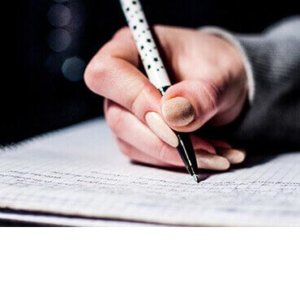- 1.1 Become familiar with academic writing as an activity involving a community.
- 1.2 Describe guidelines and strategies for interpreting academic writing assignments.
- 1.3 Describe the characteristics and expectations of various academic audiences.
- 1.4 Develop an understanding of basic conventions associated with academic writing.
English Composition I
This course is designed for a one semester Composition course and covers several common academic writing genres. Students will learn about the conventions associated with these genres and practice a process-based approach to writing. Using auto-graded self-checks, video explanations and in-class and homework activities, students will explore a variety of techniques to become a competent and effective writer.
Learning Objectives/
- 2.1 Identify the conventions and uses of exploratory writing.
- 2.2 Describe and apply pre-writing techniques for exploratory writing.
- 2.3 Use exploratory techniques to identify bias.
- 2.4 Describe and apply exploratory writing strategies for overcoming writing anxiety.
- 3.1 Identify the conventions and uses of descriptive writing.
- 3.2 Describe and apply pre-writing techniques for descriptive writing.
- 3.3 Describe and apply drafting techniques to elucidate thoughts in descriptive writing.
- 3.4 Make effective descriptive and signal word choices.
- 3.5 Describe the value of collaboration in writing and practice giving, receiving, and implementing useful feedback.
- 4.1 Identify the conventions and uses of illustrative writing.
- 4.2 Demonstrate ability to actively participate in workshopping activities as a way to generate and clarify ideas.
- 4.3 Describe and apply editing and proofreading techniques for illustrative writing.
- 4.4 Demonstrate ability to use title and intro paragraph to catch a reader’s attention.
- 5.1 Identify the conventions and uses of analytical writing about literature.
- 5.2 Demonstrate an ability to use analytical skills when engaging with literary texts.
- 5.3 Demonstrate ability to form a strong and well-structured thesis statement.
- 5.4 Demonstrate knowledge of revision techniques to strengthen paragraph structure.
- 6.1 Identify the conventions and uses of analytical writing about nonfiction.
- 6.2 Demonstrate an ability to use analytical skills when engaging with nonfiction texts.
- 6.3 Demonstrate the ability to write an effective conclusion paragraph.
- 6.4 Demonstrate the ability to use the reverse outline technique while revising.
- 7.1 Identify the conventions and uses of analytical writing about visual forms of media.
- 7.2 Demonstrate an ability to use analytical skills when engaging with visual media.
- 7.3 Demonstrate an ability to use exploratory techniques to revise an analytical essay.
- 8.1 Explain what rhetoric is and how it can be applied in persuasive and argumentative essays.
- 8.2 Define the characteristics of and difference between persuasive and argumentative essays.
- 8.3 Understand and use audience and intention to choose between a persuasive and an argumentative approach.
- 8.4 Understand the difference between grammar and style and demonstrate the ability to make effective stylistic choices.
- 9.1 Identify the conventions and uses of persuasive writing.
- 9.2 Describe the roles of audience and intention in shaping persuasive essays.
- 9.3 Identify and successfully use various forms of appeal through emotion.
- 9.4 Describe and apply drafting techniques for persuasive and argumentative essays.
- 10.1 Identify the conventions and uses of argumentative writing.
- 10.2 Describe the roles of audience and intention in shaping argumentative essays.
- 10.3 Identify and successfully use various forms of appeal through logic.
- 11.1 Describe the characteristics and types of research writing.
- 11.2 Explain and apply knowledge of how to select a strong research paper topic.
- 11.3 Identify and describe methods for conducting research in preparation for writing.
- 11.4 Identify and describe methods for synthesizing research in preparation for writing.
- 12.1 Explain what a claim is and how it is constructed in research writing.
- 12.2 Explain what evidence is and how it can be selected and used to support claims in research writing.
- 12.3 Evaluate the credibility of research sources.
- 13.1 Explain how to apply MLA formatting conventions in research writing.
- 13.2 Explain how to apply MLA style when citing sources in research writing.
- 13.3 Explain and apply knowledge of how to construct an annotated bibliography.
- 14.1 Explain the meaning and value of reflection by writers about writing.
- 14.2 Reflect on and develop a personal writing process for a variety of contexts.
- 14.3 Reflect on and explain techniques for connecting with an audience in writing.
- 14.4 Reflect on strength and weaknesses as a writer, and develop a plan to leverage the former and remediate the latter.
Be the first to review “English Composition I”
You must be logged in to post a comment.






There are no reviews yet.